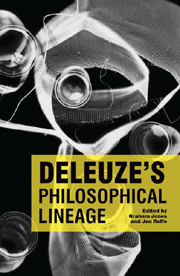Book contents
- Frontmatter
- Contents
- Acknowledgements
- List of Abbreviations
- Introduction: Into the Labyrinth
- 1 Plato
- 2 John Duns Scotus
- 3 G. W. F. Leibniz
- 4 David Hume
- 5 Immanuel Kant
- 6 Solomon Maimon
- 7 G. W. F. Hegel
- 8 Karl Marx
- 9 Hoëne Wronski and Francis Warrain
- 10 Bernhard Riemann
- 11 Gabriel Tarde
- 12 Sigmund Freud
- 13 Henri Bergson
- 14 Edmund Husserl
- 15 A. N. Whitehead
- 16 Raymond Ruyer
- 17 Martin Heidegger
- 18 Pierre Klossowski
- 19 Albert Lautman
- 20 Gilbert Simondon
- Bibliography
- Notes on Contributors
- Index
10 - Bernhard Riemann
Published online by Cambridge University Press: 12 September 2012
- Frontmatter
- Contents
- Acknowledgements
- List of Abbreviations
- Introduction: Into the Labyrinth
- 1 Plato
- 2 John Duns Scotus
- 3 G. W. F. Leibniz
- 4 David Hume
- 5 Immanuel Kant
- 6 Solomon Maimon
- 7 G. W. F. Hegel
- 8 Karl Marx
- 9 Hoëne Wronski and Francis Warrain
- 10 Bernhard Riemann
- 11 Gabriel Tarde
- 12 Sigmund Freud
- 13 Henri Bergson
- 14 Edmund Husserl
- 15 A. N. Whitehead
- 16 Raymond Ruyer
- 17 Martin Heidegger
- 18 Pierre Klossowski
- 19 Albert Lautman
- 20 Gilbert Simondon
- Bibliography
- Notes on Contributors
- Index
Summary
Mathematics played a major role in Gilles Deleuze's thought, beginning with his engagement with calculus and Gottfried Leibniz, who was also a major philosophical influence on Deleuze. Bernhard Riemann may, however, be the most significant mathematical influence on Deleuze, especially in his later works, such as the Cinema books, and in his collaborations with Félix Guattari. The conjunction of Riemann's mathematics and Deleuze's philosophy is a remarkable event in the history of twentieth-century philosophy, and it has major implications for our understanding of the relationships between mathematics and Deleuze's thought, and between mathematics and philosophy in general. Riemann's thought, however, is also part of the philosophical, and not simply mathematical, lineage of Deleuze's thought. Born from philosophy with the pre-Socratics, mathematics has a great philosophical potential, even though this potential is not always utilised in the disciplinary practice of mathematics. Riemann's work represents one of the greatest cases of exploring this potential and creating it, to begin with, in part by fusing philosophical ideas, such as those extending from post-Kantian philosophy, with his mathematical thinking. Deleuze, I would argue, takes advantage of both Riemann's mathematical and philosophical concepts in building his own philosophical concepts. Thus, the relationship between Riemann and Deleuze not only represents a remarkable conjunction of mathematics and philosophy but also establishes a philosophical friendship, as Deleuze and Guattari see it in What is Philosophy? (WP 4–5, 9–10).
- Type
- Chapter
- Information
- Deleuze's Philosophical Lineage , pp. 190 - 208Publisher: Edinburgh University PressPrint publication year: 2009



